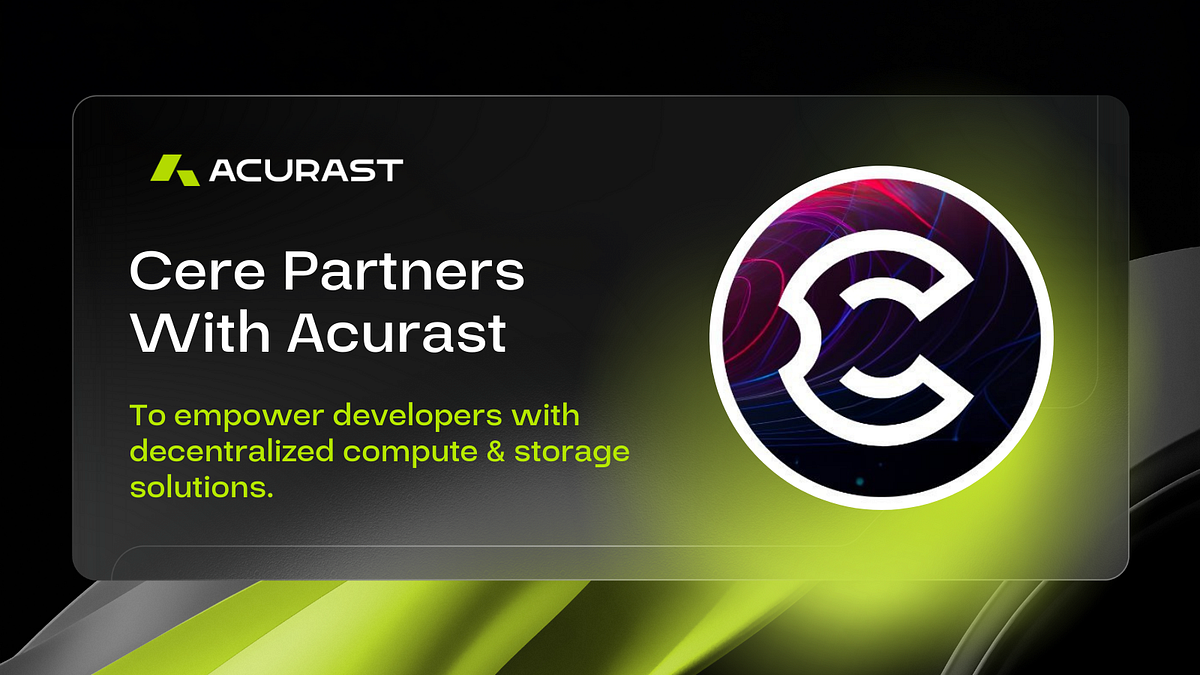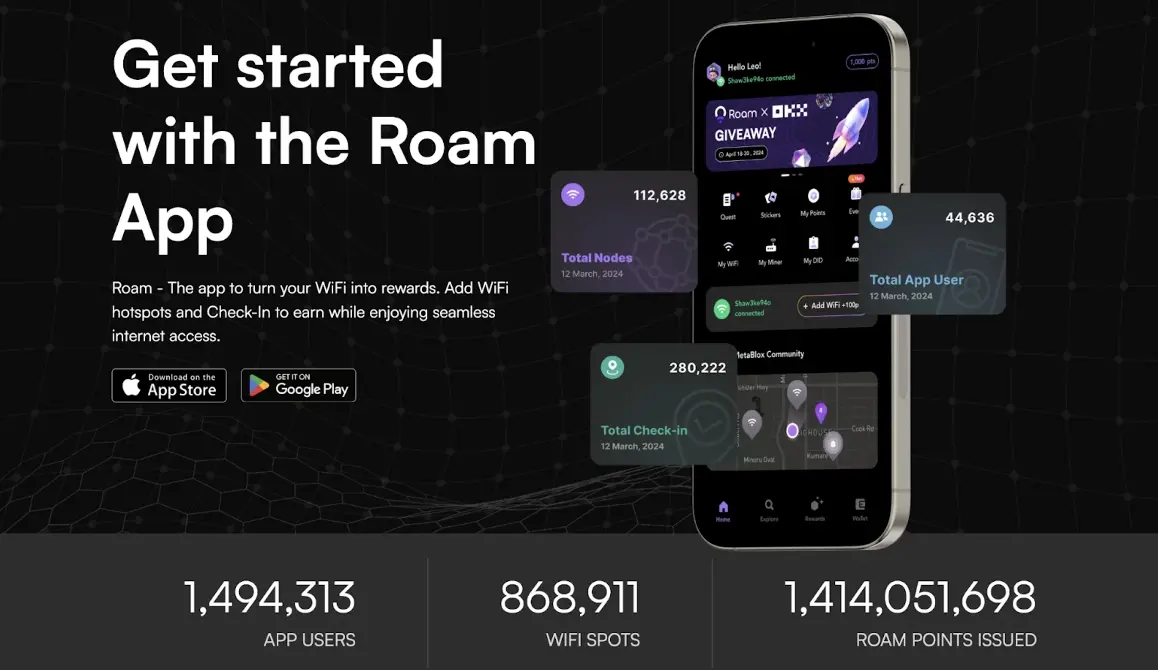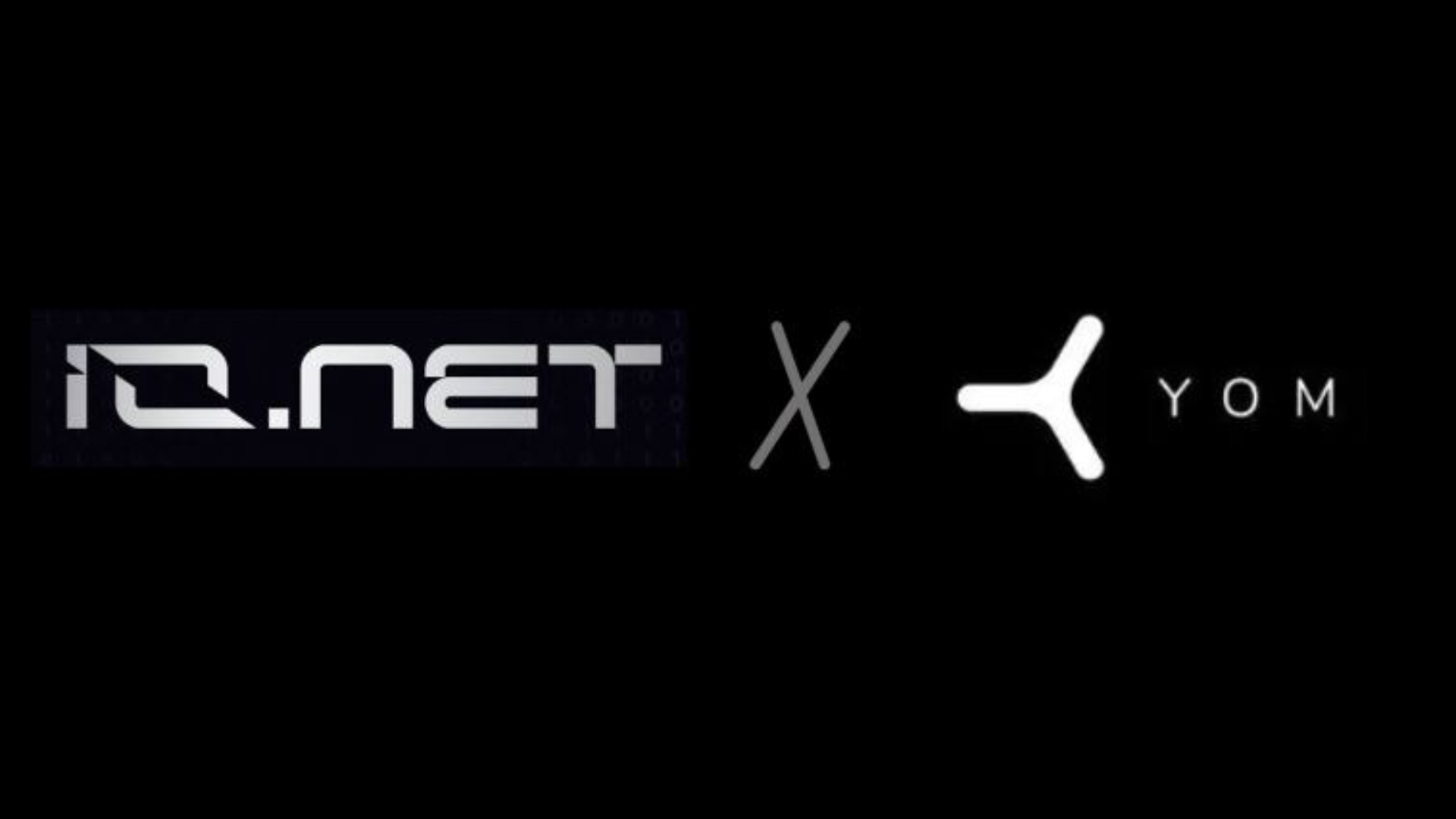Latest DePIN Cloud Services News

a year ago
Acurast Launches Processor Lite for iOS, Empowering Users to Share Computing Power
Acurast, a pioneer in decentralized confidential cloud computing, has recently launched the Acurast Processor Lite for iOS, now available on the Apple App Store. This innovative application allows iPhone users to share their device's computing power with Acurast's decentralized cloud network, providing an opportunity to earn rewards in the form of cACU tokens. By leveraging the advanced processors found in mobile devices, Acurast enables ordinary smartphones to function as powerful computing providers, significantly expanding its ecosystem and inviting iPhone users to participate in a transformative approach to cloud computing.
The Acurast Processor Lite not only enhances accessibility but also promotes sustainability by repurposing older or damaged mobile phones into affordable computing resources. This initiative offers a cost-effective alternative to traditional servers, integrating sustainability into the core of cloud infrastructure. Users can earn up to 250 cACU tokens per month simply by running the Processor connected to the internet, with additional rewards available when developers deploy applications on the Acurast Cloud using the user's processing resources. This model encourages participation and rewards users for contributing to a decentralized cloud environment.
Alessandro De Carli, Co-Founder of Acurast, emphasized the significance of this launch in democratizing cloud computing. He stated that by enabling iPhone users to contribute their devices' computing power, Acurast is fostering a more decentralized, secure, and confidential cloud infrastructure. This initiative not only focuses on technological advancement but also empowers individuals to engage in a global movement that redefines the utilization of computing resources. Users can join the Acurast Cloud Rebellion by downloading the Processor Lite app, thus supporting a shift towards a more user-driven and sustainable cloud computing landscape.

a year ago
Apillon Launches Decentralized Cloud Function Service for Web3 Developers
Apillon has announced the launch of its Cloud function service in collaboration with Acurast, aiming to revolutionize backend operations for Web3 developers. This decentralized, serverless infrastructure is designed to enhance performance, reduce costs, and provide maximum flexibility without compromising security. By leveraging Apillon’s new service, developers can focus on critical tasks without the fear of downtime, aligning perfectly with the core values of Web3. This initiative addresses the ongoing challenge of many decentralized applications (dapps) relying on traditional centralized cloud providers, which pose risks such as single points of failure and lack of transparency.
The partnership between Apillon and Acurast seeks to bridge the gap between decentralized solutions and the robustness offered by centralized counterparts. Apillon allows developers to deploy cloud functions seamlessly, supporting JavaScript, TypeScript, and Node.js code. The platform is equipped with API, SDK, and CLI tools for efficient deployment and management. Each deployment generates a custom HTTPS gateway, enabling familiar HTTP POST requests for Web2 developers. Additionally, the integration of Acurast’s confidential compute capabilities ensures unparalleled security and privacy for sensitive workloads, fostering innovation while maintaining data integrity.
The benefits of Apillon’s Cloud Function Service extend beyond mere functionality. It offers scalability, allowing automatic adjustments based on dapp demands, and cost efficiency through a pay-as-you-go model. This service is built specifically for Web3, enabling seamless interactions with smart contracts and off-chain data. With the promise of reliability and a decentralized environment, Apillon and Acurast are paving the way for a future where Web3 applications can thrive without the constraints of traditional infrastructure, empowering developers to focus on innovation and creativity.

a year ago
Akash Network: A Leader in Decentralized Physical Infrastructure
In 2024, the cryptocurrency landscape has been dominated by the trend of Decentralized Physical Infrastructure Network (DePIN), with the Akash Network emerging as a significant player in this space. Co-founded by Greg Osuri, a notable software developer and founder of AngelHack, Akash operates as an open-source "super cloud" that facilitates the buying and selling of computing resources. This model is particularly relevant in the current age of artificial intelligence, where computing power is in high demand. DePIN leverages blockchain technology to streamline access to resources that are typically fragmented, positioning Akash as a viable alternative to centralized computing solutions like Nvidia's chips.
The Akash Network aims to democratize access to computing power, making it more affordable for individual users. Osuri emphasizes the platform's core values, stating that Akash provides users with the "right to compute," promoting freedom from censorship and encouraging free thought. The native token of the Akash Network, $AKT, serves as the currency for transactions within this ecosystem, further integrating the blockchain technology into everyday computing needs. This innovative approach has garnered significant attention and usage among users.
In a remarkable demonstration of its growing popularity, Akash reported a staggering 1,729% increase in year-over-year user fees in the third quarter of 2024. This surge indicates a strong demand for decentralized computing solutions and highlights the potential of Akash to reshape the future of cloud computing. As DePIN continues to evolve, Akash Network stands out as a pioneering force in making computing resources accessible and affordable for all users, aligning with the broader trends in the cryptocurrency space.

a year ago
4EVERLAND: Pioneering Web3 Cloud Computing with a Dual-Token Model
4EVERLAND is revolutionizing the Web3 landscape with its integrated cloud computing platform that merges storage, networking, and computational capabilities. Positioned within the Decentralized Physical Infrastructure Networks (DePIN) and AI sectors, 4EVERLAND aims to facilitate a smooth transition for developers from Web2 to Web3. The platform's economic model is meticulously crafted to ensure network stability and security while promoting a sustainable incentive mechanism. This approach not only accelerates the deployment of resilient infrastructure but also guarantees a fair distribution of benefits among all stakeholders, fostering collaboration towards shared objectives that enhance the ecosystem's overall value.
The dual-token economic model of 4EVERLAND comprises $4EVER, the governance token, and $LAND, the resource-accounting token. $LAND serves as a stable payment system pegged at a fixed exchange rate, ensuring predictable billing for resource consumption. It is strictly used for resource payments within the ecosystem and cannot be traded on secondary markets. Conversely, $4EVER functions as the governance and utility token, enabling holders to participate in decision-making processes and capture value through a buyback mechanism. This dual structure effectively separates resource consumption from governance, providing a streamlined operational model that enhances user engagement and liquidity.
Looking ahead, 4EVERLAND's tokenomics are designed to balance long-term stability with growth opportunities. With a total supply of 10 billion $4EVER tokens, allocations are strategically distributed to incentivize resource providers, support community development, and ensure operational funds. The platform's vision is to establish $4EVER as a pivotal component in the decentralized internet, empowering developers and users to collaboratively build a thriving Web3 ecosystem. As 4EVERLAND continues to evolve, it is poised to become a significant player in the future of decentralized infrastructure and community-driven innovation.

a year ago
Acurast and Cere Network Forge Strategic Partnership for Decentralized Cloud Solutions
On December 12, 2024, Acurast and Cere Network announced a strategic partnership that aims to enhance decentralized cloud computing capabilities. Acurast, known for its innovative use of everyday phones in decentralized cloud infrastructure, will integrate Cere Network's decentralized data automation features into its compute deployments. This collaboration allows developers to leverage Cere's Decentralized Data Cloud (DDC) for secure and scalable data automation, enabling them to build applications that efficiently manage both computation and secure data processes within a fully decentralized environment.
To illustrate the potential of this partnership, a decentralized image converter application has been developed. This application allows users to upload HEIC images, which are processed through Acurast’s community-driven cloud compute using their phones, converting them into PNG format. The converted images are securely stored and retrieved via Cere’s DDC, demonstrating a seamless workflow that capitalizes on the strengths of both platforms. This example highlights how the integration can facilitate practical applications in the realm of decentralized computing.
The partnership is seen as a major advancement in decentralized cloud services, with both companies expressing enthusiasm about the benefits it brings to developers. Alessandro De Carli, Co-Founder of Acurast, emphasized that this integration provides a comprehensive platform for building secure decentralized applications. Similarly, Fred Jin, Co-Founder and CEO of Cere Network, noted that the collaboration enhances the capabilities of their Decentralized Data Cloud, empowering developers with automated secure data computation solutions. This partnership is poised to pave the way for innovative applications in the evolving landscape of decentralized cloud computing.

a year ago
Roam: Empowering Digital Nomads with Seamless Connectivity
In the post-pandemic world, the rise of digital nomadism has become increasingly prevalent, particularly among remote workers. This lifestyle allows individuals to travel freely while maintaining their professional commitments, with locations like Aruba and Cape Verde becoming popular choices. The demand for reliable internet connectivity is paramount for these nomads, and the Roam network is emerging as a leading solution. By providing a global wireless network, Roam aims to facilitate seamless connectivity for users regardless of their location, thus enhancing the digital nomad experience.
The challenges associated with traditional public WiFi networks, such as cumbersome login processes and security vulnerabilities, have prompted the development of OpenRoaming™ technology. This initiative, spearheaded by the Wireless Broadband Alliance, aims to create a secure and user-friendly WiFi experience. OpenRoaming™ allows users to connect to various WiFi networks without repeated authentication, ensuring encrypted data transmission. Despite the growing number of OpenRoaming™ nodes, which currently stands at over 4 million, it still represents a small fraction of the global public WiFi landscape, indicating significant room for growth.
Roam is uniquely positioned within the OpenRoaming™ alliance as a Web3 IDP project, integrating decentralized identity technology to enhance network access for users and small businesses. With innovative solutions like the Rainier MAX60 router and Roam eSIM, the platform is rapidly expanding its user base, which has surpassed 1.5 million. Roam's community-driven approach and diverse incentive models, including Roam Points and governance tokens, are designed to foster user engagement and support the growth of the OpenRoaming™ network. As Roam continues to bridge Web2 and Web3 technologies, it is set to play a pivotal role in transforming the telecommunications landscape and enhancing connectivity for digital nomads worldwide.

a year ago
YOM Partners with K4 Rally to Revolutionize Blockchain Gaming
YOM has announced an exciting partnership with K4 Rally to introduce blockchain rally racing gaming to its decentralized network. This collaboration aims to pioneer cloud gaming by utilizing a decentralized physical infrastructure network (DePIN) that allows AAA quality games, such as K4 Rally, to be streamed to any device. By leveraging URL hosting and popular platforms like Telegram, players can enjoy a diverse range of traditional and blockchain-based gaming experiences without the need for high-end gaming hardware.
K4 Rally stands out as a groundbreaking blockchain-powered rally racing game that offers players a unique play-to-earn experience. Players can own in-game assets and cars as NFTs while competing in various racing tournaments globally. This game is designed to bridge the gap between traditional gaming and blockchain technology, ensuring genuine ownership of assets and a transparent, decentralized gaming ecosystem. The integration of K4 Rally’s NFT-based asset system with YOM’s decentralized pixel-streaming network aims to enhance accessibility, allowing players to access the game directly through their web browsers.
The partnership also focuses on joint research and development efforts to improve cloud gaming accessibility through browser-based URL access. By utilizing YOM’s decentralized edge infrastructure, K4 Rally can provide players with minimal latency and uninterrupted gameplay, regardless of their location or hardware capabilities. Both companies plan to enhance user engagement and expand their player base through cross-promotion, revolutionizing the gaming experience for both traditional and blockchain gamers. This collaboration is set to break new ground in the gaming industry, offering innovative technology and decentralized solutions for an exceptional gaming experience.

a year ago
CUDOS Partners with ParallelAI to Enhance Decentralised AI Computing
CUDOS, a prominent player in sustainable and decentralised cloud computing, has recently forged a strategic partnership with ParallelAI, a pioneer in parallel processing solutions tailored for artificial intelligence. This collaboration aims to merge CUDOS's high-performance Ada Lovelace and Ampere GPUs with ParallelAI's Parahub GPU Middleware, thereby creating a decentralised AI compute environment that promises exceptional efficiency and scalability. By leveraging CUDOS's decentralised infrastructure, ParallelAI's $PAI ecosystem will gain access to robust and cost-effective GPU resources, enabling accelerated AI workloads that allow developers and enterprises to optimize GPU utilization while minimizing operational expenses.
The timing of this partnership is particularly significant as CUDOS continues to build on its recent token merger with ASI Alliance members, which include notable entities like Fetch.ai, SingularityNET, and Ocean Protocol. This strategic alignment further cements CUDOS's position within a globally recognized decentralised AI network. ParallelAI's upcoming launches of the Parilix Programming Language and PACT Automated Code Transformer are set to complement this partnership, simplifying GPU programming and enhancing the accessibility of parallel processing for developers, thus fostering innovation in the AI sector.
The collaboration between CUDOS and ParallelAI signifies a mutual dedication to promoting sustainable and accessible AI computing solutions. As the integration of their technologies advances, this partnership is poised to usher in a new era of decentralised, high-performance computing, ultimately redefining the landscape of artificial intelligence for developers and enterprises alike. With ParallelAI's ability to enhance compute efficiency by significantly reducing computation times, the synergy between these two companies is expected to empower a wide array of AI-driven projects and large-scale data analyses.

a year ago
Helium and Xnet Shift Focus to Wi-Fi in Decentralized Wireless Networks
In a significant shift within the decentralized wireless network market, Helium and Xnet are now prioritizing Wi-Fi connections over the previously favored 3.5GHz CBRS spectrum band. This change is largely driven by the challenges associated with CBRS, including interference and poor user experience. Mario Di Dio, general manager of Nova Labs' Helium network, emphasized that Wi-Fi, particularly with Passpoint technology, offers a more mature and easier deployment option. This technology, which streamlines Wi-Fi connectivity, has gained widespread support across various devices, making it a more attractive alternative for decentralized network operators.
Both Helium and Xnet have transitioned from encouraging the deployment of costly CBRS radios to promoting the installation of Wi-Fi hotspots, which are significantly less expensive. While the coverage area of Wi-Fi hotspots is generally smaller compared to CBRS sites, this strategy has led to major offloading agreements with prominent wireless network operators. Helium has secured deals with two of the three major 5G operators in the U.S., while Xnet claims to have an agreement with AT&T. These partnerships allow both companies to offload network traffic onto their respective sites, rewarding hotspot operators with cryptocurrency tokens based on the amount of data offloaded.
The evolution from decentralized wireless (DeWi) to decentralized physical infrastructure networks (DePIN) reflects a broader trend where companies are leveraging decentralized models across various sectors, including energy and mapping. Helium, a pioneer in this space, has expanded its offerings to include a mobile virtual network operator (MVNO) service, attracting around 100,000 customers. As the debate over the utilization of the CBRS spectrum continues, the shift towards Wi-Fi may reshape the landscape of decentralized networks, highlighting the growing importance of flexible and accessible wireless solutions in the telecommunications industry.

a year ago
YOM Partners with io.net to Revolutionize Cloud Gaming Experience
YOM, a decentralized cloud gaming network, has announced a strategic partnership with io.net, a leading decentralized GPU infrastructure provider. This collaboration aims to enhance YOM's pixel streaming capabilities by utilizing io.net's extensive network of globally distributed GPUs. The partnership is set to widen the accessibility of high-quality gaming experiences, enabling seamless and low-latency delivery of AAA gaming content to players worldwide, while also significantly reducing costs compared to traditional centralized server solutions.
The partnership will allow YOM to leverage io.net's infrastructure to support regions lacking individual nodes and manage overflow during peak traffic. This means that players, regardless of their physical location or network demands, can expect consistent and low-latency gaming experiences. Andrew Pringle, CEO of YOM, emphasized the importance of quickly matching GPU demand across various regions to ensure optimal user experience, stating that their vision of providing accessible AAA gaming experiences at near-zero prices is becoming clearer.
YOM's platform boasts a robust feature set, including voice chat, multiplayer capabilities, and cross-device controls, all while eliminating the need for dedicated gaming consoles. By leveraging a distributed network of gaming machines, YOM aims to deliver low-latency, cost-effective cloud gaming to any device and channel. io.net, with its decentralized physical infrastructure network, democratizes access to GPU compute capacity, making it an ideal partner for YOM's ambitious goals in the rapidly growing gaming market.
Signup for latest DePIN news and updates